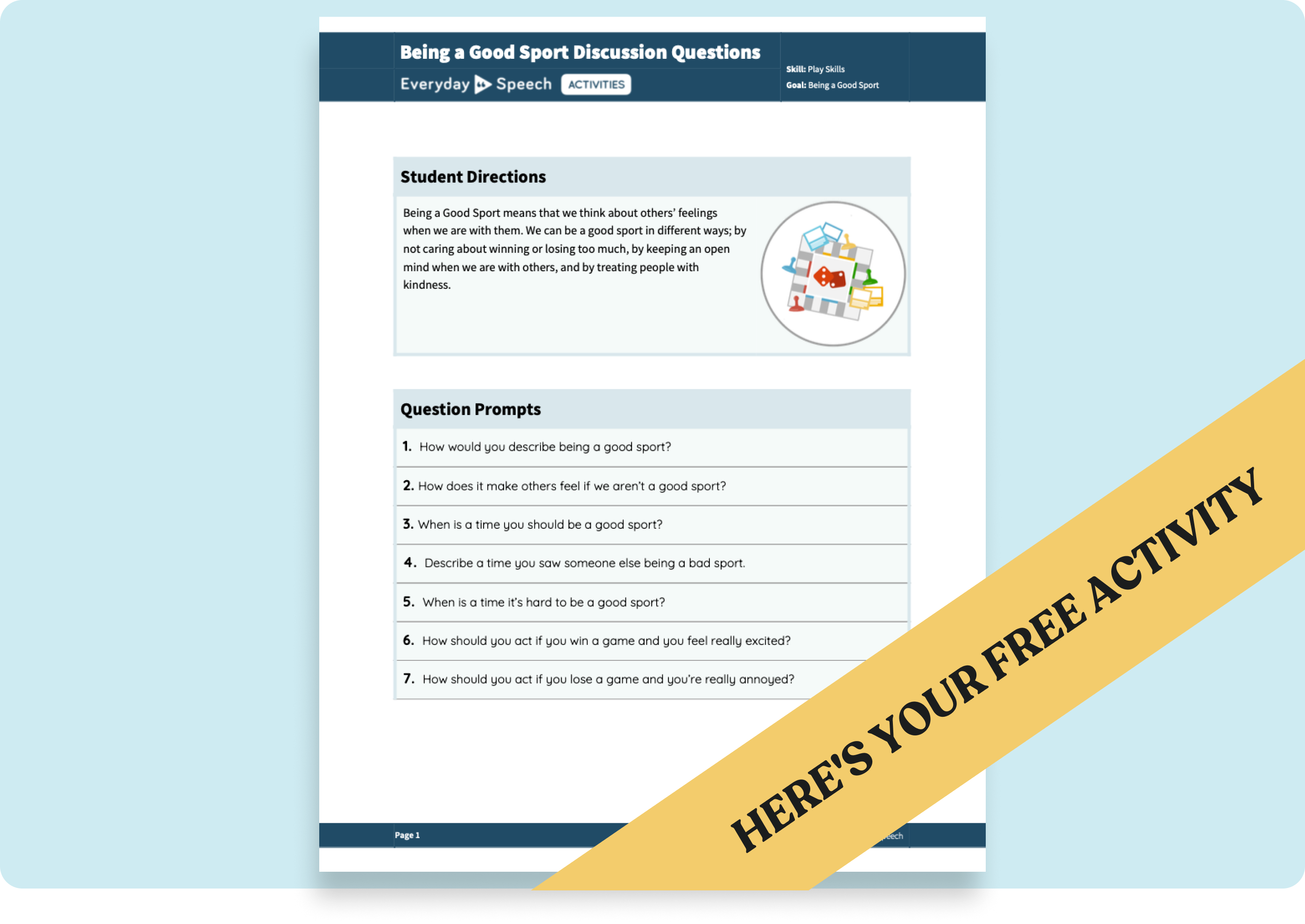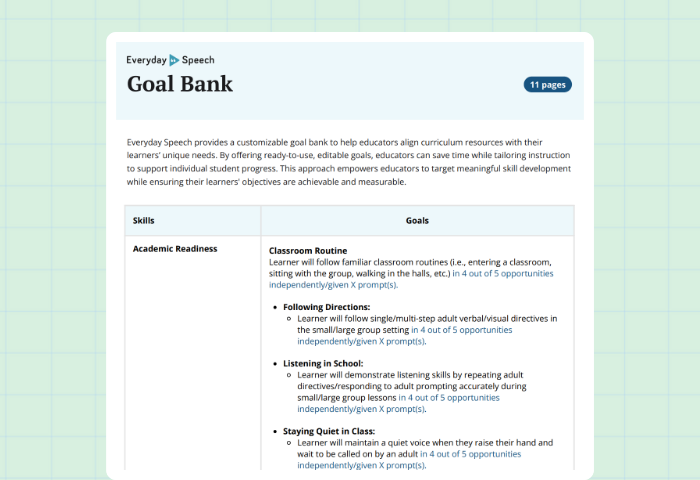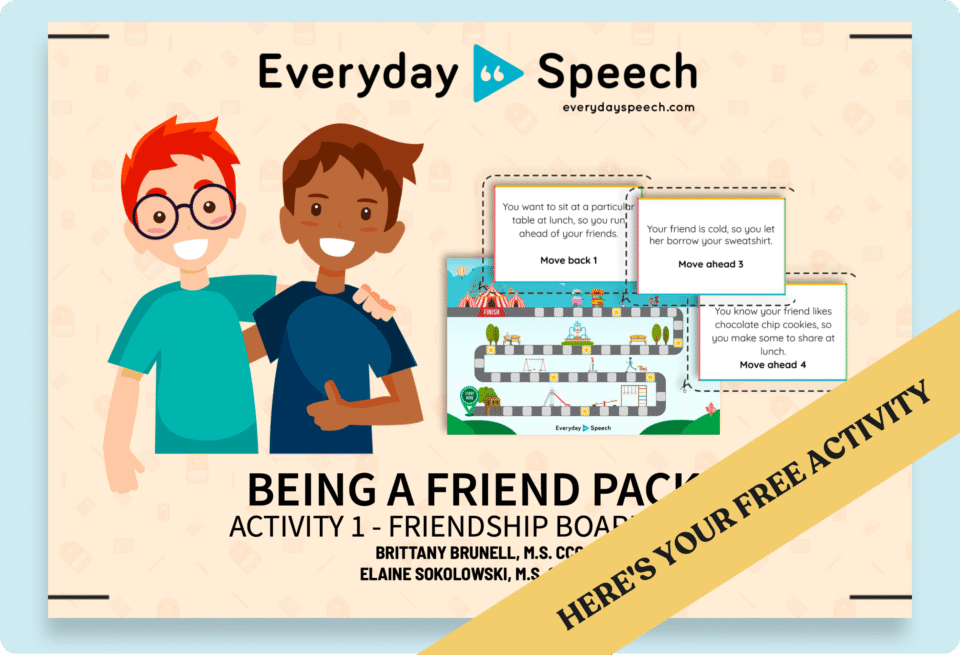Middle School Play Skills Discussion Guide: Being a Good Sport Discussion Questions
Get free social skills materials
No-prep lessons on self-regulation, emotional recognition, conversation skills, and more.
Sign up hereFostering positive peer interactions in middle school can be a challenge, especially in environments where competition is front and center. Skillful play involves much more than athletic ability or strategy. It is equally about how students handle themselves emotionally and socially during games, practices, and collaborative activities. The ‘Being a Good Sport Discussion Questions’ resource offers school-based clinicians an effective, structured way to support middle schoolers in reflecting on and strengthening their play skills, which in turn builds their ability to form and sustain friendships.
What Are Play Skills?
Get Free Activities for Friendship & Play Skills
Printable lessons, games, posters, and interactive activities that teach essential friendship skills with zero prep required
Play skills at the middle school level encompass far more than simply knowing the rules of a game. They involve behaviors and attitudes that help students participate successfully, include others, show respect for teammates and opponents, and respond appropriately to wins and losses. Essential play skills include demonstrating fairness, taking turns, managing frustration, encouraging others, accepting outcomes, and being a gracious winner or loser. These skills are closely connected to the broader friendship skill set, as the ability to work and play well with peers lays the foundation for meaningful and lasting social relationships.
Related resources: See our full list of social skills lessons.
In middle school, the dynamics of peer interactions become more complex and often carry higher social stakes. Students may experience increased pressure to compete, impress classmates, or fit in with certain groups. As a result, moments of play—whether during structured physical education activities, lunchtime games, classroom competitions, or after-school clubs—become critical opportunities for learning and practicing positive social behaviors. Helping students build strong play skills enables them to navigate these scenarios with confidence and empathy, reducing the occurrence of conflicts and exclusion.
Why Teach Play Skills?
Promoting play skills in middle school is a proactive approach that supports both social development and a positive school climate. Key reasons to target these skills include:
- Facilitates smoother peer interactions during group activities and games.
- Equips students to handle disappointment or frustration without resorting to negative behaviors.
- Reinforces fair play and the importance of following agreed-upon rules.
- Supports both verbal and nonverbal communication during competitive and cooperative tasks.
- Encourages empathy and understanding among diverse groups of students.
- Reduces conflicts and increases feelings of belonging among peers.
- Provides a safe space for students to reflect on their reactions and make positive changes.
- Builds a foundation for healthy, lasting friendships.
By nurturing play skills during these formative years, clinicians can help students become not only good teammates but also well-rounded individuals who value fairness, respect, and mutual support.
Lesson Plan: Using Being a Good Sport Discussion Questions
The ‘Being a Good Sport Discussion Questions’ activity is a no-prep tool that supports in-depth conversations around sportsmanship, fair play, and positive participation.
Designed specifically for middle school students, it features a series of open-ended questions that invite learners to reflect on their experiences and consider how their actions impact themselves and others. The flexibility of the format allows it to be used in small groups, classroom circles, or individual sessions.
Step 1: Setting the Stage
Begin by creating a welcoming, judgment-free environment where students feel comfortable sharing honestly. Explain that the goal is to explore what it means to be a good sport—not just in sports, but in any situation where play, games, or competitions are involved.
Consider using an engaging opener such as, “Think about the last time you played a game—were there any moments when it was hard to be a good sport?” This helps students start thinking about the topic before delving into the discussion questions. Emphasize that everyone’s input is valuable and that there are no right or wrong answers, only opportunities to learn.
Get Free Activities for Friendship & Play Skills
Printable lessons, games, posters, and interactive activities that teach essential friendship skills with zero prep required
Step 2: Introducing the Discussion Questions
Distribute the ‘Being a Good Sport Discussion Questions’ resource, either as printed handouts or by displaying questions on a screen. Review the expectations for respectful participation: listening without interrupting, responding thoughtfully, and keeping comments focused on behaviors rather than labeling peers.
Sample questions from the resource include:
- What does being a good sport look like?
- Why might it be hard to be a good sport sometimes?
- How do you feel when you lose a game or competition?
- What are some ways to show respect to others while playing?
- How can you support teammates or classmates even if you are not winning?
Encourage students to answer in their own words and give examples from personal experience. Invite volunteers or use a round-robin format to ensure everyone has a chance to participate.
Step 3: Facilitating Reflective Dialogue
Guide the discussion by prompting students to elaborate on their responses. If a student mentions feeling upset when losing, ask, “What do you usually do when you feel that way?” or “How could you handle that feeling if it happened again?” This deepens reflection and helps students generate strategies for managing emotions during play.
If conflicts around fairness or cheating arise, help the group brainstorm constructive solutions. Point out positive behaviors when students mention examples, such as congratulating the winning team or offering encouragement after a tough loss. For students who struggle with sportsmanship, reframe difficult moments as learning opportunities.
It is helpful to keep discussions moving forward by acknowledging all views, then gently steering students toward prosocial behaviors. Connect their ideas back to the broader benefits—how being a good sport strengthens friendships and makes game time more enjoyable for everyone.
Step 4: Practicing Skills in Real Time
Whenever possible, transition from discussion to action. If group time allows, play a quick low-stakes game or collaborative activity, encouraging the group to practice showing good sportsmanship. Before beginning, remind students of key strategies identified in the earlier discussion—such as congratulating opponents, thanking teammates, and accepting outcomes with grace.
After the activity, circle back for a brief reflection: “Who noticed someone being a good sport? What did they do? How did it make you feel?” Acknowledging positive behaviors in the moment reinforces the skills discussed and helps students internalize them for future use.
Step 5: Planning for Ongoing Growth
Close the session by inviting students to set a personal goal for their next game or group activity. This might be “I will encourage my teammates,” or “I will stay calm if I lose.” Encourage students to share their goals with the group or write them down as a reminder.
Let students know they can revisit these discussion questions any time they want to check in on their progress or talk through new challenges. Consider sending the activity home or posting printouts in common areas as reminders of what being a good sport looks like during recess, PE, and extracurriculars.
Download the resource here: Being a Good Sport Discussion Questions Activity
Supporting Play Skills After the Activity
Skill building does not end when the discussion closes. Providing ongoing support ensures that students continue to make progress. After using the Being a Good Sport Discussion Questions, consider these follow-up strategies:
- Offer consistent, specific praise when students display good sportsmanship during any group activity.
- Integrate quick “sportsmanship check-ins,” inviting students to reflect on recent experiences and troubleshoot any challenges.
- Collaborate with physical education instructors, classroom teachers, or club sponsors to reinforce target behaviors across settings.
- Use role-play or social stories to practice responding to common scenarios, such as losing a game or witnessing unfair treatment.
- Provide visual reminders—such as posters or cue cards—highlighting the characteristics of a good sport.
- Encourage student leadership by inviting those with strong play skills to serve as positive role models or peer mentors.
Consistent reinforcement and opportunities for practice help students generalize these skills beyond the initial lesson into everyday interactions.
Wrapping Up: Strengthening Friendships Through Play
Developing play skills goes beyond improving performance in sports or games. It fosters the kind of respectful, supportive behaviors that underlie strong peer relationships throughout middle school and beyond. By utilizing the ‘Being a Good Sport Discussion Questions,’ clinicians can create space for meaningful reflection, guided practice, and ongoing growth. Over time, these efforts help create classrooms and communities where students feel safe to participate fully, celebrate each other’s successes, and navigate challenges with confidence and care. Investing in play skills today lays the groundwork for healthy friendships, greater self-awareness, and a positive school climate for all students.




